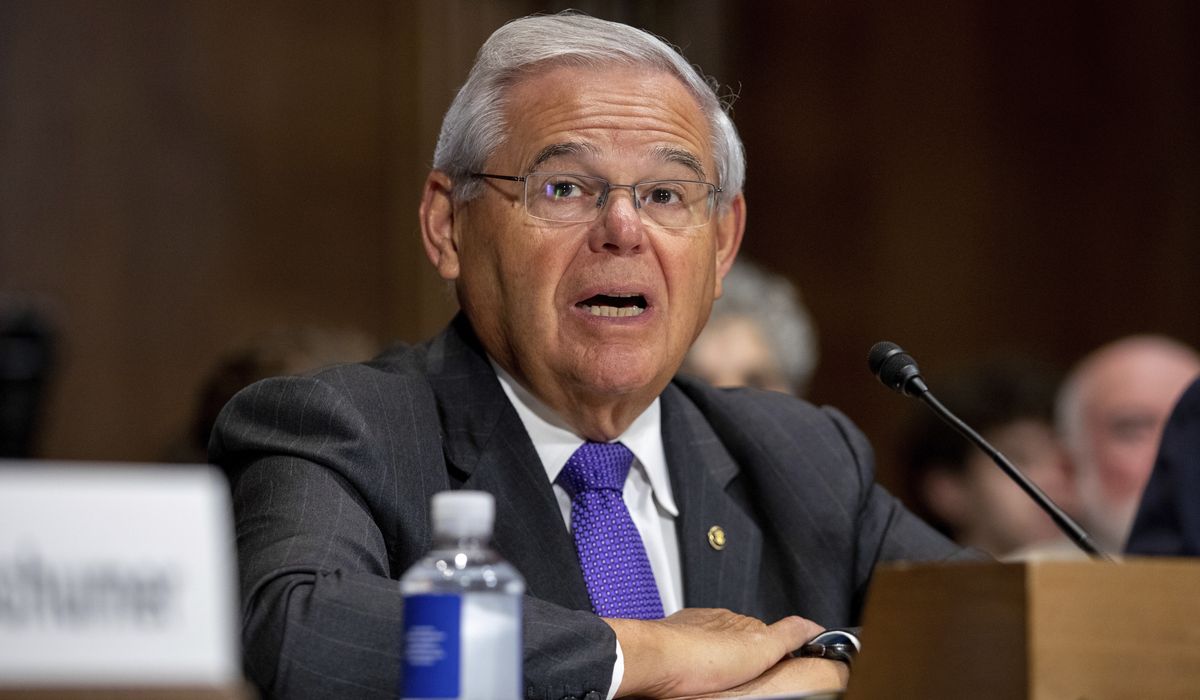

Senate Foreign Relations Committee Chairman Robert Menendez on Thursday bowed to Republican pressure and delayed a vote to repeal the president’s war powers granted for the two Iraq wars.
Mr. Menendez, New Jersey Democrat, acquiesced to Republican demands for a public hearing on the move, which they argue would handcuff the president’s ability to order military strikes in the volatile region.
“Matters of war and peace should be debated openly, so the American people can be provided with the full rationale for why the administration believes this is the right course of action, and how President Biden intends to protect American interest in light of this policy change,” said Sen. Bill Hagerty, a Tennessee Republican on the committee.
Republicans on the Senate panel delayed an initial committee vote last month on the repeal of the 1991 and 2002 authorizations for use of military force or AUMFs against Iraq.
When they requested hearings to include testimony from the Defense and State departments, Mr. Menendez agreed to a closed hearing, which was conducted on July 12.
Republicans then demanded a public hearing.
The repeal of the AUMFs — which provided legal justification for the President George H.W. Bush’s Persian Gulf War and President George W. Bush’s invasion of Iraq in 2003 — would be the first rollback of presidential war powers since 9/11. Critics say the appeal could limit Mr. Biden’s ability to respond to threats from Iran and the Islamic State group that persist in the Middle East.
The House passed separate bills last month to repeal the authorizations. The Senate measure needs a committee vote to advance it to the full Senate.
Senate Majority Leader Charles E. Schumer, New York Democrat, supports the repeal and has committed to a floor vote by the end of the year.
The Biden administration also supports the repeal.
Sen. Mitt Romney of Utah led fellow Republicans on the committee in sending a letter last month to Mr. Menendez requesting a delay of the vote and both public and classified hearings on the bill.
“We should fully evaluate the conditions on the ground, the implications … and how adversaries — including ISIS and Iranian backed militia groups — would react,” the senators wrote. “It is also important to consider the policy and potential legal consequences of our reduced presence in the region and the impending withdrawal of forces from Afghanistan.”
Multiple attacks in recent weeks have targeted U.S. personnel in the region. In late June, the Biden administration carried out an airstrike on Iranian-backed militia fighters in Iraq and Syria in response to attacks. The administration carried out a similar strike in February.
Mr. Biden cited executive war powers under Article II of the Constitution for the strikes, straying from previous administrations’ tendency to lean on the 2002 AUMF for engagements in the region. President Obama cited the authorization in 2014 as legal authority to send troops back in the theater to fight the Islamic State in Iraq and Syria (ISIS). In 2020, President Trump cited the 2002 authorization as the legal basis for carrying out the drone strike that killed Iranian Quds Force commander Qassem Soleimani while Soleimani was in Iraq.
Lawmakers criticized Mr. Obama and Mr. Trump for citing the authorizations, arguing that the strikes were not within the legal framework of the authorization.
Others say Congress should replace the dated authorizations before repealing them outright and that Mr. Biden‘s response to threats in the region could be hampered without a replacement AUMF on the books.
“I once again want to applaud Chairman Menendez’s appreciation for the gravity of the topic, and the need for a robust public discussion by granting my request for a public hearing,” Mr. Hagerty said. “Hearing from high-ranking national security officials will help inform my own decision-making as I fully evaluate the implications of maintaining or repealing the AUMF.”
